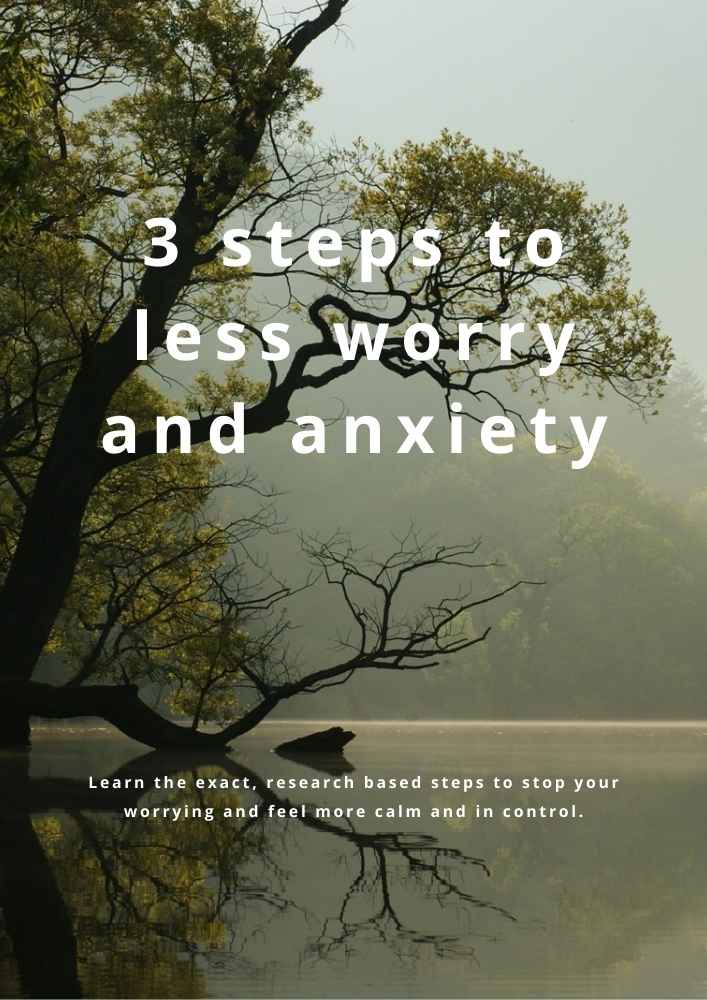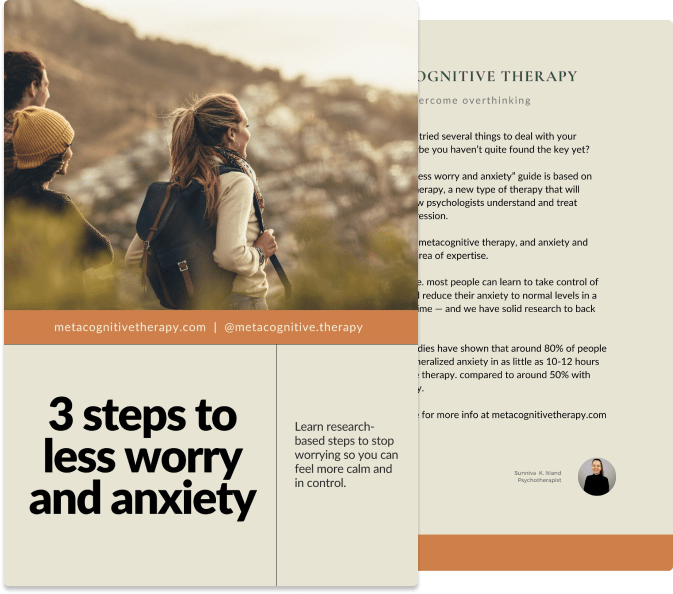Navigating the news: How to manage anxiety during political unrest and global conflict

Download our best tips on reducing anxiety and worrying
Learn three powerful metacognitive therapy steps to stop the worry cycle, reduce anxiety, and feel calmer in everyday life.
.jpeg)
.jpeg)
It’s easy to feel overwhelmed by everything happening in the world right now — the political tension, high stakes elections, war and conflict, and economic instability — all of which are streamed in nonstop social media coverage and 24/7 news cycles.
Never before have we had such constant access to global events, and the mental health impact is monumental. In the US, for example, reports show 77% of Americans feel significant stress over the state of politics and future of the nation, with 20% losing sleep over political news.
While staying informed is important, excessive worry can take a serious toll on our wellbeing. Caring about the world is a wonderful thing, but it can become unproductive and paralyzing if we’re completely consumed with worry.
So how do we balance civic responsibility with healthy news habits? Metacognitive Therapy (MCT) offers concrete strategies to help manage news-related anxiety without completely avoiding current events. Here’s how to establish boundaries and take back control of your thoughts.
1. Limit your news consumption
With endless access to news, it’s tempting to constantly doom scroll and check news updates in an attempt to feel in control. But excessive news consumption just fuels anxiety. Instead of letting the news dictate your day, set intentional limits on how much time you spend consuming it.
Decide in advance how often you’ll check the news — that could look like 15 minutes in the morning and in the evening, or only a few times a week. This allows you to stay informed without getting lost in a cycle of fear and speculation. Being intentional about your goal when consuming news can also help break the cycle of endless scrolling: Are you staying informed, or are you trying to control your anxiety by anticipating what will happen next?
2. Avoiding the news altogether isn’t the answer
While excessive exposure can be harmful, completely avoiding the news isn’t helpful, either. Cutting out news altogether can backfire, as avoidance tactics tend to actually increase worry. When we lack information, our minds can catastrophize and fill in the gaps with worst-case scenarios, which might be even worse than what’s happening in the news.
Instead of cutting out the news entirely, focus on managing your response to it. You will inevitably come across news throughout the day — at work, the gym, at dinners, and on social media. A balanced approach lets you stay informed without feeling consumed by anxiety.

Download our best tips on reducing anxiety and worrying
Learn three powerful metacognitive therapy steps to stop the worry cycle, reduce anxiety, and feel calmer in everyday life.
3. Postpone your worry
If you find yourself spending hours worrying about global events, try postponing your worrying to a specific “worry time” each day. By giving yourself a designated time (30 minutes after dinner, perhaps) to worry, you can address your concerns without letting them take over your entire day. This experiment also shows you that you have control over how much time you spend worrying.
During this designated window, you can explore your concerns, talk about current events with loved ones, or find constructive ways to help. Whether it’s engaging in political action or supporting humanitarian efforts, using this time productively can help you shift into action and purpose. If you arrive at your worry time and don't feel you need to address anything, don't use it! Outside of this worry time, practice letting anxious thoughts be when they arise, and postponing them to later.
4. You don’t have to engage with every thought
A key principle of Metacognitive Therapy is recognizing that you can’t control your thoughts, but you can control whether or not you engage with them. Think of your thoughts like incoming phone calls or emails — you can’t control the messages that are sent to you, but you don’t have to open and respond to every single one immediately.
Instead of wrestling with every anxious thought about conflict overseas, or political tensions in your country, acknowledge that these concerns exist, and then shift your focus back to what you were doing before this stress took over. You can acknowledge fear without allowing it to dictate your day. This doesn’t mean ignoring reality, but instead choosing when and how much mental energy to devote to these issues.
5. Stick to your routine
When anxiety takes over, it’s easy to put your routine on hold. Especially when world events are so devastating, it can leave us wondering: What’s the point of our day-to-day habits, when there’s so much chaos?
But maintaining structure in your day is one of the best ways to create stability amid uncertainty. Continue with the things that regularly fill your time — going to work, exercising, seeing friends, and engaging in hobbies. The more you stick to your normal routine, the less likely you are to let anxiety take over your life.
The self-accountability of keeping up with your daily activities and responsibilities will help you stay more present and show up with clarity, and reinforce the reality that life goes on, even in difficult times.
6. Embrace moments of joy
In times of crisis, many people feel guilty for experiencing happiness. But giving yourself permission to laugh, relax, and enjoy your life doesn’t mean you don’t care about the state of the world. Just as you can love someone without thinking about them every moment of the day, you can care about politics and global events without obsessing over them 24/7.
Taking breaks from heavy topics is necessary for your emotional well-being. Remember to prioritize activities that bring you joy — these moments of relief help you recharge, so you aren’t operating from a state of emotional exhaustion.
You’re not alone if you feel anxiety about world events right now, but the news doesn’t have to consume your life. Metacognitive Therapy helps you recognize that while we may not be able to change the world’s uncertainties, we can change how we respond to them, and that learning to engage less with our worries can help us navigate turbulent times with resilience.
If you're looking for more support during these uncertain times, you can book a session with one of our MCT-certified therapists here.



